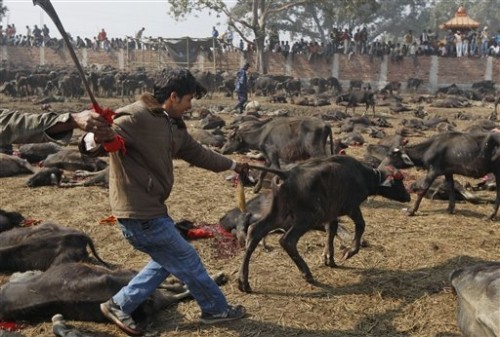Massacre de Gadhimai : halte au relativisme culturel
Mass sacrifice of animals is a tradition that belongs in the past
Two stories in today’s news represent opposite extremes in global attitudes to animal welfare.
In Australia, the world’s oldest sheep, Lucky, has died at the age of twenty three in her home in Australia.
She lived in an air-conditioned shed, was hand-fed with crushed grain (having lost her teeth, she was unable to graze normally), and she was allowed into the family home to watch television.
Meanwhile, over the next two days, up to a million Hindu worshippers are gathering in a village in Nepal near the Indian border, where nearly 300000 rats, pigeons, poultry, pigs, sheep and buffalo will be slaughtered in the world’s biggest animal sacrifice.
It happens every five years, in a traditional religious ceremony.
Participants expect that if they want anything over the next five years, all they need to do is bring along a live animal, sacrifice it to the goddess Gadhimai.
The sacrifices are not carried out humanely: the animals have their throats slit with traditional blades, and then they’re decapitated.
It’s gory, the animals suffer as they die, and the ritual has raised protests from thousands of animal welfare activists both locally and around the world.
They say that it’s tradition, it’s been done for hundreds of years, and in the name of cultural relativism, we should all shut up and let them get on with it.
Where should a line be drawn?
If humans were being treated savagely, would we tolerate it out of respect for a different culture?
I know that our world in the West is far from pure: for every over-pampered sheep like Lucky there are tens of thousands of sheep, pigs, poultry and cattle, being crammed into slaughterhouses and killed.
But at least our killing is done humanely, as far as we can judge.
Regulations ensure that animals are stunned prior to the cut of a knife, so that they do not suffer pain at the end.
And yes, slaughter may sometimes be done in an inadequate way so that animals do suffer, but this should be the exception rather than the rule.
Science has taught us how to recognise pain in our fellow sentient beings, and how we can prevent it.
The deliberate infliction of pain on animals can, and should, be stopped, whether it’s in Manchester, New York or Nepal.
Tags: animal sacrifice, animal welfare, slaughter
